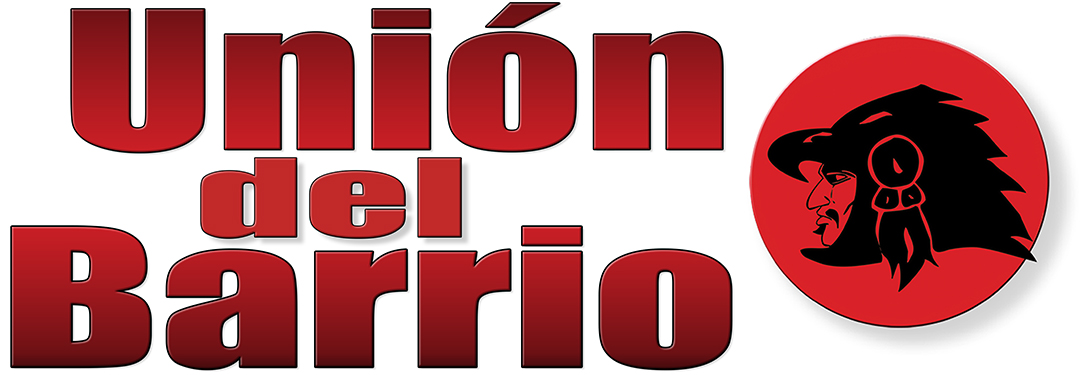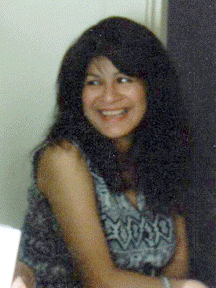
We Still Carry The Combative Spirit Of Patricia Marín In Our Hearts and Minds.
Compañera Patricia Marín, October 2, 1952 to December 19, 1995.
Text originally published in the October – December 1995 issue of ¡La Verdad! Revised and re-published for aguilaycondor.net on the 15th Anniversary of the passing of Compañera Patricia Marín. Revised 12/19/2017.
On the evening of December 19, 1995, Patricia Marín passed away in her sleep. Patricia was a leading member of Unión del Barrio, the National Chicano Moratorium Committee, the Chicano Mexicano Prison Project, Unión del Barrio Women’s Commission (since renamed the Comité de Mujeres Patricia Marín), the Raza Rights Coalition, and participated in many other ways in the struggle for Raza Liberation. The following is a brief synopsis of her life and what she meant to Unión del Barrio and our gente’s struggle for freedom.
We first came into contact with Compañera Patricia Marín in 1986 while she was attending Rancho Santiago College in Orange County, California. During that period she had been playing a leading role within the Movimiento Estudiantil Chicano de Aztlán (MEChA) chapter on that campus, and had served as MEChA advisor during the years 1988 and 1989. It was during this period that she began to work more closely with Unión del Barrio.
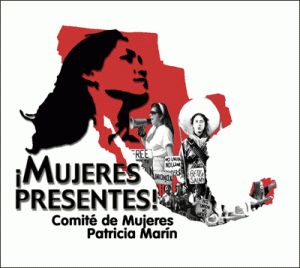 In 1990 the Orange County Chicano Moratorium Committee was formed, in which Patricia served as the National Chicano Moratorium Committee (NCMC) Representative. It was from that point in time – a period of reconstruction of a national Chicano Mexicano Movement – that Patricia Marín integrated herself into our peoples liberation movement with a level of dedication and sacrifice that few will be able to match.
In 1990 the Orange County Chicano Moratorium Committee was formed, in which Patricia served as the National Chicano Moratorium Committee (NCMC) Representative. It was from that point in time – a period of reconstruction of a national Chicano Mexicano Movement – that Patricia Marín integrated herself into our peoples liberation movement with a level of dedication and sacrifice that few will be able to match.
Many years have passed since that period of general unity building for our Movimiento. During those years our organization and the Movimiento in general has seen many people come and go, dozens of names and faces that participated for a short time, and for whatever reason, these individuals found a way to rationalize their departure from the Movimiento. At times there is reason to remember them for something they did or said while they were involved, yet more often they quickly fade back in to obscurity. Yet more importantly, and at the same time, throughout those years of building and growth extraordinary persons have also risen, forged from the gains and setbacks of daily struggle. These individuals become part of our collective memory, and they are honored every day that our struggle continues. And since ours is a struggle for liberation, we can rest assured that we will never forget them. Patricia Marín is an among those extraordinary comrades.
Patricia was one of those people who were immediately liked, for her unpretentious ways, her honesty, her character, her naturalness, her selflessness, her understanding, and her general comradely attitude. Many of us had the pleasure and honor of knowing her in a personal way – but these traits in her personality were the first and most apparent of her qualities, even to those who knew her only in passing. What must be recognized is that Patricia was so much more than just a beautiful individual – these wonderful characteristics she expressed were only a foundation upon which was built one of the greatest comrades the Chicano Mexicano struggle has ever produced. It is only by recognizing this can we express fully what Compañera Patricia Marín truly represented to us, Unión del Barrio, and to the liberation struggle she died fighting for.
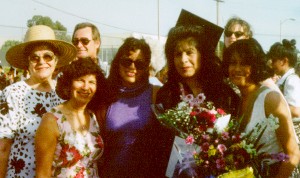 When Patricia passed away she was a mature woman of forty-three years of age. We raise this in order for all to understand that she entered the struggle not led by the idealism of youth, nor as a half-hearted, self-serving pseudo-revolutionary. Over time she had come to identify clearly the true nature of the vendido, hispanic, poverty pimp agency mentality, and said “chale” and then integrated herself totally into the liberation struggle of La Raza.
When Patricia passed away she was a mature woman of forty-three years of age. We raise this in order for all to understand that she entered the struggle not led by the idealism of youth, nor as a half-hearted, self-serving pseudo-revolutionary. Over time she had come to identify clearly the true nature of the vendido, hispanic, poverty pimp agency mentality, and said “chale” and then integrated herself totally into the liberation struggle of La Raza.
Patricia participated in liberation struggle as a woman with an abundance of individual experience and maturity, and it was this experience that moved her to action. Before the Movimiento, her life was one of sacrifice and struggle, surviving as a single mother with all the contradictions of a colonial society on her back. The well being of her family was always on her mind, and her activism was forever dedicated to her children. In other words, Patricia had many years of life experience, and also a family to care for – for many other people these things are enough to convince them to give up struggle. For Patricia it had the opposite effect: she not only dedicated the rest of her life to struggle, she did so in the name of her children and because of her life experience.
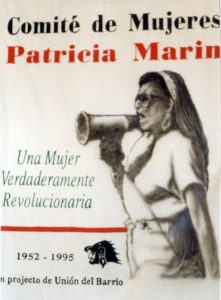 Even during those first days with MEChA, her experience and clear vision placed her in a position of respect during which time the friendship and warm feelings we had (and continue to have) for her were ever increasing. It was this life experience that gave her a true understanding of the terrible nature of colonialism, and in the last years of her life armed her as an anti-imperialist fighter. This profound spirit of struggle and contempt for imperialism gave her what many of those around her lacked – the hindsight, the courage, and the vision to not only join in the building of liberation struggle but to become a leader in every sense of the word.
Even during those first days with MEChA, her experience and clear vision placed her in a position of respect during which time the friendship and warm feelings we had (and continue to have) for her were ever increasing. It was this life experience that gave her a true understanding of the terrible nature of colonialism, and in the last years of her life armed her as an anti-imperialist fighter. This profound spirit of struggle and contempt for imperialism gave her what many of those around her lacked – the hindsight, the courage, and the vision to not only join in the building of liberation struggle but to become a leader in every sense of the word.
A person like Patricia did not require elaborate arguments. It was sufficient for her to know that her people existed in a state of perpetual oppression, and that there was an organization that was inspired by genuine revolutionary and patriotic ideals. That was more than enough for Patricia to make her people’s struggle her own.
There are countless examples that we could recite that represent the extremely high level of commitment and dedication this Compañera maintained. All of us that knew her also knew how she was always willing to sacrifice to whatever level was necessary for the benefit of the group. If Patricia had a dollar in her pocket she would donate seventy-five cents – and keep the quarter for the sole purpose of avoiding criticism for being over-generous. She was well known for her habit of volunteering for the most tedious and difficult of tasks, while at the same time never demanding recognition. Patricia was never one to seek recognition, and she had no interest in titles. Her activism was truly led by a deep internal drive to better the condition of La Raza.
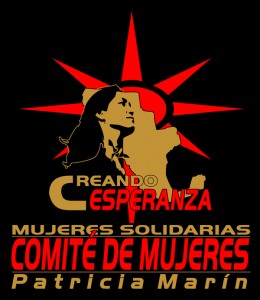 Patricia had spent the week before her death in San José, assisting and providing direction for the compañeras and compañeros building Unión del Barrio in that area. With her return back to San Diego she was full of positive information – energized and excited by the bright future of our organizing efforts in northern California. If she had lived two weeks longer she would have seen the results of her nomination for the position of Coordinator of the San Diego chapter of Unión del Barrio. Patricia Marín passed away at the pinnacle of her activism and development. There is no doubt in any of our minds that if she had lived she would have easily reached the highest levels of leadership possible in Unión del Barrio – her determination and dedication to La Causa could not have produced any other results.
Patricia had spent the week before her death in San José, assisting and providing direction for the compañeras and compañeros building Unión del Barrio in that area. With her return back to San Diego she was full of positive information – energized and excited by the bright future of our organizing efforts in northern California. If she had lived two weeks longer she would have seen the results of her nomination for the position of Coordinator of the San Diego chapter of Unión del Barrio. Patricia Marín passed away at the pinnacle of her activism and development. There is no doubt in any of our minds that if she had lived she would have easily reached the highest levels of leadership possible in Unión del Barrio – her determination and dedication to La Causa could not have produced any other results.
During her activism in Orange County she was chosen to represent the Orange County Chicano Moratorium at the 1990 Twentieth Commemoration of August 29th. Her presentation at this historic event focused on the building of unity and organization towards the betterment of La Raza. “We must build for Unity. . . ” was what she exclaimed during the East Los Angeles event. From that point forward, Patricia put her words into action – every year until her passing she served on the national Mesa Directiva of the National Chicano Moratorium Committee. Later, after her move to San Diego, she assumed a leadership role within the Raza Rights Coalition, and at the time of her death she was the Outreach Coordinator for the mobilization against the 1996 Republican Convention.
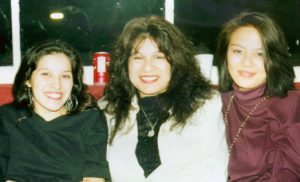 Patricia joined Unión del Barrio in 1993, and immediately played a central role in several Unión del Barrio projects, most notably the Chicano Mexicano Prison Project (CMPP). In many ways, Patricia was the heart of the CMPP – she organized meetings, maintained records for all its participants, corresponded with the prisoners, originally served as Secretary on the Mesa Directiva, represented the CMPP by giving presentations, and wrote articles printed in the CMPP newsletter Las Calles Y La Torcida. Patricia Marín was central to formulating a vision and purpose for the project in general, and at the time of her death she had recently been elected into the position of Coordinator of the Chicano Mexicano Prison Project. Patricia also played a leading role in the founding and building of Unión del Barrio’s Women’s Commission. Her life experience tremendously enriched this process, and the growth of the Commission is partially due to her commitment and dedication.
Patricia joined Unión del Barrio in 1993, and immediately played a central role in several Unión del Barrio projects, most notably the Chicano Mexicano Prison Project (CMPP). In many ways, Patricia was the heart of the CMPP – she organized meetings, maintained records for all its participants, corresponded with the prisoners, originally served as Secretary on the Mesa Directiva, represented the CMPP by giving presentations, and wrote articles printed in the CMPP newsletter Las Calles Y La Torcida. Patricia Marín was central to formulating a vision and purpose for the project in general, and at the time of her death she had recently been elected into the position of Coordinator of the Chicano Mexicano Prison Project. Patricia also played a leading role in the founding and building of Unión del Barrio’s Women’s Commission. Her life experience tremendously enriched this process, and the growth of the Commission is partially due to her commitment and dedication.
Patricia Marín was the best example of what a true compa is and should be. She molded her personal life around her commitment to liberation struggle. Originally her move to San Diego was for the purpose of expanding her activism and developing herself as a revolutionary fighter by immersing herself in struggle. While in San Diego and maintaining an incredible level of activism, she still found time to study; at the time of her death she had recently been awarded a Master’s Degree in multi-cultural Counseling. She was always quite open about the motives behind her studies – “I’m doing this so I can offer more monetary help to the group.” The true revolutionary character Patricia possessed becomes readily apparent – especially since her educational/career goals had become side-noted in her life because, in all honesty, the Movimiento had become her life.
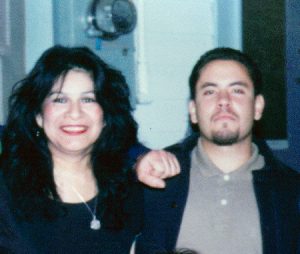 Patricia also understood that people have a relative value in history – the idea that movements are not defeated when people fall, that the forward march of history cannot and will not be halted when leaders fall. Her life expressed her faith in people, her faith in ideas, and her faith in examples. Because Patricia Marín was the a tremendous example of a Revolutionary Mexicana. We understand that in real revolutionary struggle one wins or dies. Our sister Patricia left us as a revolutionary – up to her final days we see she spent as a builder of Mexicano liberation, laying the foundation for the birth of a better future for our gente. For those of us that knew her, it rests on us that we take up the banner of her example and make it our own – this, and only this, that will give Patricia Marín the honor she deserves. We know she would want it no other way.
Patricia also understood that people have a relative value in history – the idea that movements are not defeated when people fall, that the forward march of history cannot and will not be halted when leaders fall. Her life expressed her faith in people, her faith in ideas, and her faith in examples. Because Patricia Marín was the a tremendous example of a Revolutionary Mexicana. We understand that in real revolutionary struggle one wins or dies. Our sister Patricia left us as a revolutionary – up to her final days we see she spent as a builder of Mexicano liberation, laying the foundation for the birth of a better future for our gente. For those of us that knew her, it rests on us that we take up the banner of her example and make it our own – this, and only this, that will give Patricia Marín the honor she deserves. We know she would want it no other way.
We greatly appreciate the value of her example. We are convinced that our people will strive to live up to her example; that people like her will continue to emerge. It is not easy to find a person with all the virtues that were combined in Patricia. It is not easy for a person, spontaneously, to develop a character like hers. We say that she is one of those people who are difficult to match, and virtually impossible to surpass. We also understand that it is the example of people like her that contributes to the development of people of the same caliber.
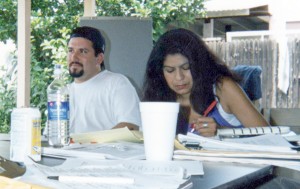 While the leading organizational responsibilities and community work of Patricia Marín have ended with her passing, her importance to Unión del Barrio has not ended. Her physical ties to the group may have ended, but it is her status as a revolutionary that will forever keep her within our ranks. Her memory will live on in our renamed Women’s Commission, the Comité de Mujeres Patricia Marín (CMPM) and the Comité Local Patricia Marín in Los Angeles, CA.
While the leading organizational responsibilities and community work of Patricia Marín have ended with her passing, her importance to Unión del Barrio has not ended. Her physical ties to the group may have ended, but it is her status as a revolutionary that will forever keep her within our ranks. Her memory will live on in our renamed Women’s Commission, the Comité de Mujeres Patricia Marín (CMPM) and the Comité Local Patricia Marín in Los Angeles, CA.
In closing, we wish to remember Patricia Marín as the highest expression of a mother, sister, friend, comrade, and revolutionary. We must uphold her for her magnitude as a woman, her discipline, and her spirit of devotion towards the liberation of our pueblo. She served our revolutionary struggle honorably, and in these moments of remembrance we must lift our spirits high with optimism for the future, for we know that freedom will be ours – and Patricia Marín is part of our final road towards victory! Therefore we say with pride:
¡Hasta La Victoria – Siempre!
¡Que Viva Patricia Marín!
Life Experiences Can Eventually Produce Organizers
Note: The following is an excerpt from an autobiographical statement that Patricia Marín wrote on December 3, 1993, as part of a course she was enrolled in at the time.
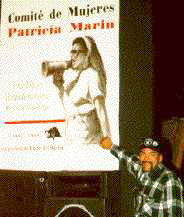 At age thirty I began to take community college classes. I had intentionally planned to take typing classes “just to get by” in order to find any type of clerical work. This was my first response to the crisis situation that I was in.
At age thirty I began to take community college classes. I had intentionally planned to take typing classes “just to get by” in order to find any type of clerical work. This was my first response to the crisis situation that I was in.
After being financially dependent on welfare services on and off for over ten years, I found myself in a situation that was overwhelming. My husband of nine years, who was addicted to drugs, literally left me, and my three sons, on our own. My job skills and experience were very limited. A year after he had left, I was finally convinced by a friend to take college classes with her. Without any long term goals or objectives, I enrolled in classes that were “safe” for me.
Later on, while taking additional classes at Rancho Santiago College [in Orange County, CA] I encountered a counselor (who is now a good friend) that would offer me not only academic guidance, but much more. He assisted and nurtured the development of my confidence, self-esteem, and perseverance. He saw in me strength and courage, and he really believed that I could make it. It took me some time before I saw this in myself, yet it happened.
I still struggle with day-to-day issues, but a major difference is that now I know how to deal with them, and incorporate these differences into my educational and life plans. I would very much like to assist and influence students in similar ways that my friend did for me and for so many other students. Giving back to my community is important, and this is one way I want to carry this on.
The specific population that I would like to work with is the Chicano Mexicano population. Being Chicana, I can identify with having to deal with the barriers of social, economic, and racial issues, problems that my community faces in pursuing higher education. A great number of our people are faced with ongoing oppression, poor housing, inadequate health care, discrimination, low paying jobs, and the list continues. Unless these problems are addressed, then these contradictions will continue to rise. This can be seen in the increased drop-out rates, drug use, and violence among our young people. Counselors should be able to address these concerns.
Today’s Chicano Mexicano youth are faced with stereotyping, prejudice, peer pressure, and not enough positive role models in their lives. I have personally experienced these barriers, and see that these situations have worsened drastically these last years.
My personal experiences (whether negative or positive), and my commitment to the political advancement of the Chicano Mexicano people, will help me in my future work, especially in turning negative situations into a learning experience that leads to possible solutions. For example, two years ago another serious problem came about from within my family. For two years my home environment was stressful and sometimes violent. My personal experiences and what I’ve learned in school enabled me to survive this crisis. These life experiences, I have learned, are what can eventually produce organizers.
Over the years, through my community organizing, I have been introduced to the writings of several radical writers, and I learned that the organizer’s personal experiences can become the basis for teaching others. For an organizer to teach is an art, one that is learned through the experiences of others; not at their expense, but to create an environment where everyone can develop.
